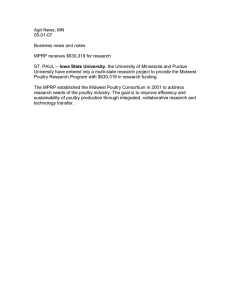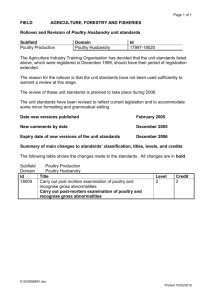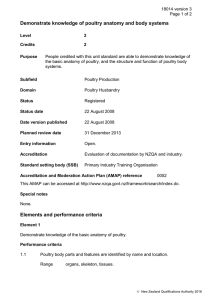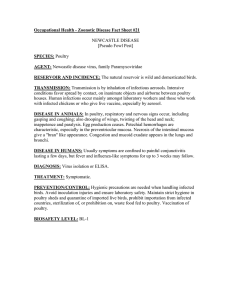POULTRY HUSBANDRY Demonstrate knowledge of poultry anatomy and reproduction
advertisement
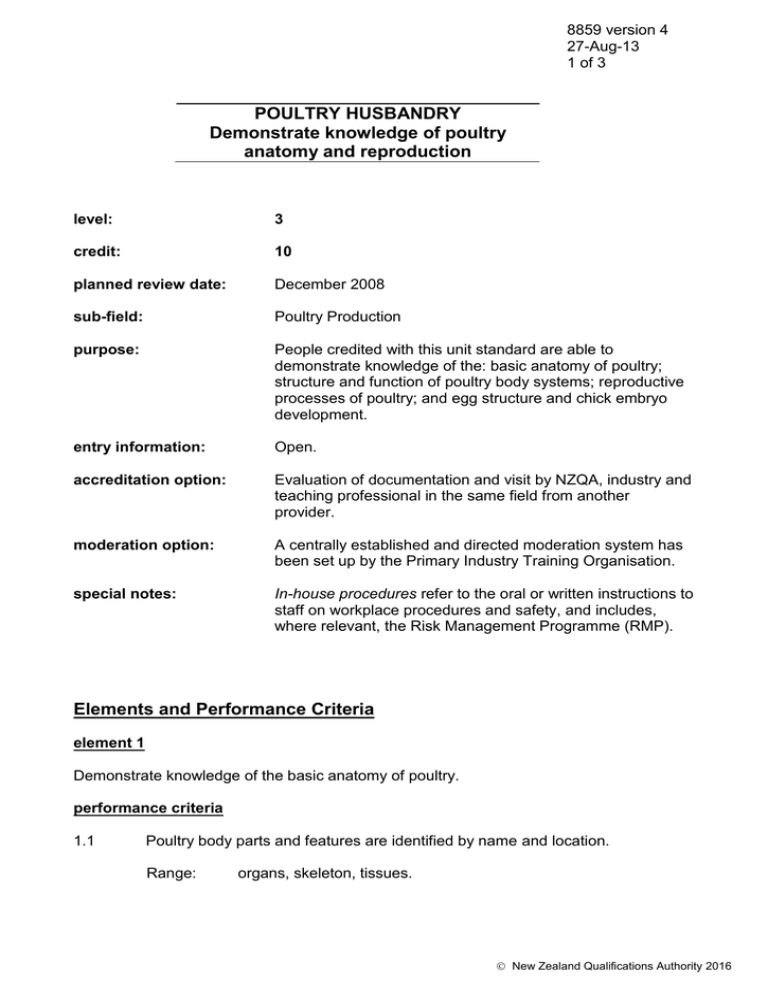
8859 version 4 27-Aug-13 1 of 3 POULTRY HUSBANDRY Demonstrate knowledge of poultry anatomy and reproduction level: 3 credit: 10 planned review date: December 2008 sub-field: Poultry Production purpose: People credited with this unit standard are able to demonstrate knowledge of the: basic anatomy of poultry; structure and function of poultry body systems; reproductive processes of poultry; and egg structure and chick embryo development. entry information: Open. accreditation option: Evaluation of documentation and visit by NZQA, industry and teaching professional in the same field from another provider. moderation option: A centrally established and directed moderation system has been set up by the Primary Industry Training Organisation. special notes: In-house procedures refer to the oral or written instructions to staff on workplace procedures and safety, and includes, where relevant, the Risk Management Programme (RMP). Elements and Performance Criteria element 1 Demonstrate knowledge of the basic anatomy of poultry. performance criteria 1.1 Poultry body parts and features are identified by name and location. Range: organs, skeleton, tissues. New Zealand Qualifications Authority 2016 8859 version 4 27-Aug-13 2 of 3 POULTRY HUSBANDRY Demonstrate knowledge of poultry anatomy and reproduction 1.2 The major internal anatomical features of poultry are identified by name and location. Range: heart, lungs, liver, kidneys, digestive tract, brain, reproductive system, skeleton. element 2 Demonstrate knowledge of the structure and function of poultry body systems. Range: circulatory, respiratory, reproductive, digestive, nervous, immune. performance criteria 2.1 The body systems of poultry are identified, and their major components are described. 2.2 The primary functions of each body system are defined, and the processes that occur in each body system, and their interrelationships, are described. element 3 Demonstrate knowledge of the reproductive processes of poultry. performance criteria 3.1 The reproductive stages and cycles are identified, and the processes involved are described. Range: mating, fertilization, oviposition, ovulation, egg formation. 3.2 The major hormones controlling reproduction are identified, and described in terms of their role in the reproductive process. 3.3 The factors affecting egg production are identified, and their influence described, in accordance with in-house procedures. Range: may include but is not limited to – nutrition, environment, health, mating ratio, breeding and selection, husbandry, management. New Zealand Qualifications Authority 2016 8859 version 4 27-Aug-13 3 of 3 POULTRY HUSBANDRY Demonstrate knowledge of poultry anatomy and reproduction element 4 Demonstrate knowledge of egg structure and chick embryo development. performance criteria 4.1 The components of the egg are identified and their functions are described. Range: blastodisc, yolk, yolk membranes, albumen, shell membranes, shell, cuticle. 4.2 Chick embryo development is described in terms of anatomical changes, hormonal control, and conditions required for incubation. 4.3 Hatching is described in terms of the processes involved and the conditions required. 4.4 Hatchability is defined, and described in terms of the influencing factors. Comments on this unit standard Please contact the Primary Industry Training Organisation standards@primaryito.ac.nz if you wish to suggest changes to the content of this unit standard. Please Note Providers must be accredited by the Qualifications Authority or a delegated interinstitutional body before they can register credits from assessment against unit standards or deliver courses of study leading to that assessment. Industry Training Organisations must be accredited by the Qualifications Authority before they can register credits from assessment against unit standards. Accredited providers and Industry Training Organisations assessing against unit standards must engage with the moderation system that applies to those standards. Accreditation requirements and an outline of the moderation system that applies to this standard are outlined in the Accreditation and Moderation Action Plan (AMAP). The AMAP also includes useful information about special requirements for providers wishing to develop education and training programmes, such as minimum qualifications for tutors and assessors, and special resource requirements. This unit standard is covered by AMAP 0052 which can be accessed at http://www.nzqa.govt.nz/site/framework/search.html. New Zealand Qualifications Authority 2016
